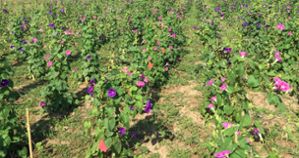Pandemic-motivated project advances understanding of plant response to stress
It was the beginning of the COVID pandemic and Michigan State University plant biologist Emily Josephs could not go into her lab to work because of safety restrictions. So, she called up friend and colleague, Regina Baucom, from the University of Michigan, to see if she would be interested in collaborating on a project.

Josephs studies the evolutionary genetics of wild and domesticated plants using genomic data and does lab experiments to understand how evolution has shaped the variation we see today.
Baucom, an associate professor in the U-M Department of Ecology and Evolutionary Biology, works on plant evolution and ecological genomics.
“Gina had this great system already in place to study morning glory,” said Josephs, assistant professor in MSU’s Department of Plant Biology in the College of Natural Science. “And I knew my lab could analyze the data, so this could be a perfect project to start while everyone was locked down. It was great working with Gina. She’s been an exceptional mentor and science colleague.”
The results of this study have now been published in the journal Evolution Letters.
For years, Baucom’s team has been studying the effects of weed killer on the common morning glory (Ipomoea purpurea). For the experiments, the herbicide is sprayed on the plants and the healthiest survivors are harvested. The seeds from these “survivors” are then planted and the experiment is repeated many times over.

“This process is called experimental evolution,” Josephs said. “Genes from these survivors are then compared to plants that have not been exposed to herbicide to see what adaptations have occurred.”
Plants respond to stressful environments in different ways, but it can be hard to determine if these responses are helping the plants persist in the stress or just a sign that the stress is altering their ability to function. Josephs and Baucom wanted to understand if a plant’s environmental response to stress is adaptive, or helpful to the plant.
In the current study, multiple morning glory seeds from Baucom’s experimental evolution studies were planted. After six weeks, half of the plants were exposed to herbicide at approximately half the suggested dose. Leaves from both groups were then collected eight and 32 hours after spraying and frozen in liquid nitrogen. RNA was extracted from these leaves and sequenced to measure gene expression levels.
Josephs and Adrian Platts, a bioinformatician in her lab, used MSU’s High Performance Computing Center (HPCC) to analyze the gene expression data. They found that thousands of genes showed environmental responses to herbicide, while hundreds of genes evolved gene expression changes during experimental evolution for herbicide resistance. By comparing the direction of expression changes, they were able to show that gene expression responses to spray tend to be adaptive.

“I am excited that Emily thought to use the data in a way that begins to address the influence of gene expression changes on adaptation to herbicide,” Baucom said. “Working with the Josephs lab is fantastic and fun and has pushed this model system into an exciting new set of questions.”
“Understanding whether these responses are beneficial or hurtful is really important for predicting how plants will respond to new stresses,” Josephs said. “Here, we showed that when you spray morning glory with herbicide, it changes its gene expression in ways that benefit the plant.”
This type of study had never been done before in plants. Previous work on adaptive changes had been conducted on fruit flies and guppies, and the studies showed changes were maladaptive, so the organisms didn’t benefit from the environmental responses.
“This work is also important to farmers because it is important to know what genetic changes may be occurring in plants when they are exposed to herbicide,” Josephs noted. “Also, as climates change and human interventions become more pervasive, it is also important to predict plant responses to these stressful environments.”
The two researchers are currently preparing a grant to the National Science Foundation to continue this work.
Banner image: Experimental evolution is studied in the common morning glory (Ipomoea purpurea). Credit: Regina Baucom.